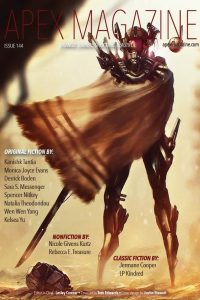Gary K. Wolfe Reviews Silver Nitrate by Silvia Moreno-Garcia
 Silver Nitrate, Silvia Moreno-Garcia (Del Rey 978-0-59335-536-7, $28.00, 324pp, hc) July 2023.
Silver Nitrate, Silvia Moreno-Garcia (Del Rey 978-0-59335-536-7, $28.00, 324pp, hc) July 2023.
Since her first novel in 2015, Silvia Moreno-Garcia has demonstrated an almost astonishing degree of versatility, ranging from historical fiction to vampire horror to romantic noir, classic Gothic, sword and sorcery, and even H.G. Wells with last year’s The Daughter of Dr. Moreau. Characteristically, she has invested these familiar genres with a complex multicultural sensibility, at times reinventing them in the context of Mexican history and legends. But while she can draw knowledgeably on classic texts like the Mayan Popol Vuh or paint convincing portraits of Mexican culture and politics in 19th-century Yucatan or Mexico City of the 1920s or 1970s, she’s equally knowledgeable about genre, as evidenced by that allusion to the Wells novel, by her well-known familiarity with Lovecraft (in her editorial work as well as her fiction), and now by the epigraph to her new novel Silver Nitrate, from one of M.R. James’s classic ghost stories, ‘‘Casting the Runes’’ (runes turn out to be an important plot point in the novel). That intriguing title, by the way, shares an interesting conceit with Moreno-Garcia’s first novel, Signal to Noise: the notion that certain kinds of what we might call legacy media – vinyl records in the case of Signal to Noise, the famously combustible old-fashioned nitrate film stock in the present novel – can serve just as effectively as talismans of the supernatural as any of the ancient books or stones or creepy portraits of classic horror fiction. (It’s not unique to Moreno-Garcia, as any number of cursed videotapes or haunted cameras attest, but she makes much more intelligent thematic use of it than most.)
Montserrat Curiel is a skilled sound editor who finds it increasingly difficult to get assignments in the male-dominated film industry of Mexico City in the 1990s. Her lifelong best friend Tristan is a fading soap-opera actor haunted by the accidental death of his girlfriend a decade earlier, for which he feels partly responsible. When Tristan moves into a new apartment, he discovers his neighbor is Abel Urueta, an almost forgotten director of a series of horror films in the 1950s, whose work is admired by both Tristan and Montserrat. Over a dinner which involves a lot of geeking out over classic horror directors like Tod Browning and Jacques Tourneur, Urueta tells them about a Nazi-connected German occultist named Wilhelm Ewers, who worked on the screenplay of Urueta’s last unfinished film, and who, influenced by the likes of Aleister Crowley and Anton LaVey, came to believe that movies could be used to amplify the casting of spells. Silver nitrate film stock, already being phased out in the 1950s because of its flammability, was especially effective ‘‘because silver is a powerful conduit for spells.’’ When a local cinematheque shows interest in a retrospective of Urueta’s work – including showing a print of that unfinished film – the three of them are drawn into an increasingly ominous web involving a silent film star who hardly seems to age, the ghost of Tristan’s girlfriend, a mysterious screenwriter with a dual identity, an apparently haunted abandoned publishing house, and the frightening prospect of somehow resurrecting Ewers himself.
Moreno-Garcia is a master of pacing, gradually ramping up the supernatural stakes while peppering the tale with fascinating bits of occult esoterica ranging from Bulwer-Lytton’s The Coming Race (which gave rise to vril societies, based on his notion of a kind of immortality elixir) to Jack Parsons, the rocket engineer connected to everyone from Crowley to L. Ron Hubbard. But the novel rests mainly on a few sharply drawn characters: Montserrat, a skilled professional coping with the endemic sexism of the 1990s film industry as well as her lifelong crush on her best friend; Tristan, whose commitment to Montserrat lends him a kind of stability in the face of a largely failed acting career; and Urueta, a talented has-been director whose need to be remembered ranges from the craven to the arrogant. Some of the secondary characters, like Montserrat’s sister Areceli, don’t really have much to do, despite a subplot involving her cancer treatments, while others, like that silent film actress, seem to know exactly how to hit their marks in a Gothic melodrama. None quite fall into stereotypes, though, and Moreno-Garcia’s affection for a nearly forgotten corner of film history, as well as her almost gleeful appreciation of occult arcana, are undeniable fun, as are her two engrossing main leads.
Gary K. Wolfe is Emeritus Professor of Humanities at Roosevelt University and a reviewer for Locus magazine since 1991. His reviews have been collected in Soundings (BSFA Award 2006; Hugo nominee), Bearings (Hugo nominee 2011), and Sightings (2011), and his Evaporating Genres: Essays on Fantastic Literature (Wesleyan) received the Locus Award in 2012. Earlier books include The Known and the Unknown: The Iconography of Science Fiction (Eaton Award, 1981), Harlan Ellison: The Edge of Forever (with Ellen Weil, 2002), and David Lindsay (1982). For the Library of America, he edited American Science Fiction: Nine Classic Novels of the 1950s in 2012, with a similar set for the 1960s forthcoming. He has received the Pilgrim Award from the Science Fiction Research Association, the Distinguished Scholarship Award from the International Association for the Fantastic in the Arts, and a Special World Fantasy Award for criticism. His 24-lecture series How Great Science Fiction Works appeared from The Great Courses in 2016. He has received six Hugo nominations, two for his reviews collections and four for The Coode Street Podcast, which he has co-hosted with Jonathan Strahan for more than 300 episodes. He lives in Chicago.
This review and more like it in the June 2023 issue of Locus.
 While you are here, please take a moment to support Locus with a one-time or recurring donation. We rely on reader donations to keep the magazine and site going, and would like to keep the site paywall free, but WE NEED YOUR FINANCIAL SUPPORT to continue quality coverage of the science fiction and fantasy field.
While you are here, please take a moment to support Locus with a one-time or recurring donation. We rely on reader donations to keep the magazine and site going, and would like to keep the site paywall free, but WE NEED YOUR FINANCIAL SUPPORT to continue quality coverage of the science fiction and fantasy field.
©Locus Magazine. Copyrighted material may not be republished without permission of LSFF.






